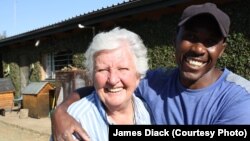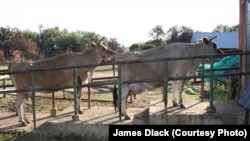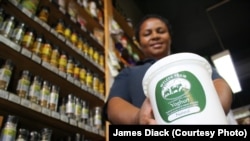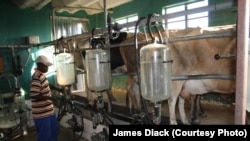The retort from this South African farmer when contacted for an interview is brusque: "I don't know why you'd want to speak with me. I was born in 1935, I'm not photogenic and I don't do anything important. And most of all I'm not polite."
But, while Elizabeth Aymes was indeed born 81 years ago, her other statements above prove to be dubious at best.
Back in the 1950s it was almost unheard of for women anywhere to study agriculture at college. But that's exactly what Aymes did, eventually receiving several diplomas in the subject.
"From when I was young I had a love for the outdoors; I never wanted to be a nurse or a teacher or all those other girly things at the time," she says.
Aymes adds that as soon as she saw some land in the Hekpoort valley, in South Africa's North West Province, more than 50 years ago, she knew she had her farm.
The terrain is rugged and rocky, just like the 80-year-old herself, with her tough, mottled skin and no-nonsense approach to everything.
The Hekpoort area sometimes experiences good rains in summer, making the fields lush, but more often than not the area is arid.
Against advice from other farmers, she decided to start Weleda Dairy Farm.
"People told me I was mad. They said, ‘How can you run a dairy farm in such a dry area? Dairy farms need to be in places of consistent, good rainfall.' But I've always gone against the grain and besides, I like cows," she comments, smiling mischievously.
Aymes irrigates her land with water from boreholes, but acknowledges that "water has always been a worry" on her farm, and droughts have almost bankrupted her on a number of occasions.
One of the first organic farmers
In another pioneering move, Aymes decided to farm organically, decades before it became fashionable in agricultural and foodie circles.
"I knew that I was not prepared to use artificial fertilizers or poisons," she says.
She doesn't give her jersey cows any growth stimulants or antibiotics, and never sprays her land with pesticides.
The farmer's animals are free range, grazing on natural Highveld grass all day, sheltered in spacious barns at night.
Her business produces a variety of products, from milk to cheese to yogurt, containing no preservatives.
"There is nothing in these things that anybody would be allergic to, other than lactose," the farmer snaps.
Electric pumps attached to cows' udders make loud sucking sounds as they deposit milk in large, transparent tanks in a milking shed.
Aymes says her cows produce small amounts of milk because she doesn't do anything "artificial" to them.
"Cows can have things implanted in their ears, hormones, which will increase the production. And that means that on the same amount of food they will give you far more milk. That means it is economically more viable."
Unlike some other organic farmers, she doesn't condemn mass-produced dairy products, like pasteurized milk and preserved cheeses.
"They have an important place in the market," she maintains, "because they're much cheaper than the organic stuff, which many South Africans can't afford."
Excellent labor relations; tough employer
Aymes has a strong relationship with her employees. She's built houses for them. She almost adopted one, a Mozambican, as her son, after authorities threatened to deport him.
"No matter what we did they refused to give Pedro permanent residence; maybe they wanted a bribe. So I went to Home Affairs and I said, ‘Okay, I'll adopt him as my son.' Only then did they give him the papers he deserved, allowing him to stay and work in South Africa."
But Aymes's workers find her to be a tough taskmaster.
"I do expect them to be punctual. And if they aren't, they lose money. One of them came to complain to me that last week he lost 50 rand [about 3.5 dollars]. And I said, ‘Yes, that's because you were late.' And I said, ‘And today it's 20 past six. You were not here at six; the cows should be here at six, so you are going to lose it again,'" she says bluntly.
But the way Aymes runs her farm and treats her animals results in excellent dairy products.
One of her biggest fans is the manager of Fresh Earth organic food store in Johannesburg's Emmarentia suburb. Andre Brown sells Weleda Farm's butter, cheese and yogurt.
"We've been stocking Elizabeth's stuff from Weleda for quite some time now and there's a reason why we'll keep on stocking her stuff. Elizabeth's quite scrupulous if it comes to her products. She's a very proud woman; she's a very nice boeretannie [farmer auntie]. She doesn't deviate from her philosophy about what she's doing with her product," says Brown.
Farm attacks
Successful as Aymes is, it's never easy for her on the farm.
Once, three men broke into her house at night and threw her out of bed, demanding money.
"This is where they held me down," she says, pointing to a carpet stained with brown blotches. "The one sat on me and bruised my ribs. He was quite big. He held me with such force that the skin on my arm and a few veins burst open… Those are bloodstains you see there."
On another occasion robbers shot into her bedroom while she was asleep. Her curtains still have the bullet holes; her wall is also pockmarked with gunfire damage.
"I wasn't even so much afraid of the shots but the breaking glass was very noisy… You can see up top there where they hit; that was the third one. The fourth one would have hit me in bed but I managed to get out of bed and into the bathroom, where I could find my shorts," Aymes recalls.
She pressed a panic button alerting her security company, and the invaders fled under a hole they'd made under the electric fencing.
Defiance
As we talk, a thunderstorm unleashes welcome rain on a parched valley.
Aymes has plenty of reasons to give up farming, from violence against her to looming drought to financial struggles.
But she says in more than half a century of "battle" she's never considered quitting.
Her wrinkled, weathered face contorts into defiance as she shouts: "I won't ever leave this place! I won't stop farming!"
Aymes quietens and says, "The reason why I do it is because I'm a farmer; there's nothing else I can do… I am only here because I love to be here. I have planted every tree; I have put in every fence… I can't abandon this place, my animals and workers."
It's this love, she says, that's more powerful than any fear inside her.








